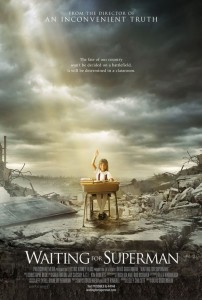One of the crueler aspects of the newly released documentary “Waiting for ‘Superman’” occurs toward the conclusion. The film, which highlights the decline of public education, tracks several young families and their struggles to get their children the best education possible. Throughout the film, many families explore and apply their kids to alternative public schools — charter schools or public boarding schools. Unfortunately, when too many families apply, law dictates that a public lottery be held to determine school choice.
According to the film, this is how the futures of many kids in this country are decided. Hundreds of families cram into school gymnasiums and auditoriums across the country for these lotteries. Often, a cage filled with numbered lottery balls is placed on stage. As the lever is cranked and the balls bounce around, the entire room collectively holds its breath. The shriek of joy from the family in the back whose lucky number has rolled out is drowned out by the tension that doubles over in the room. Nervous mothers cross their fingers and pray, knowing that their goal of a fair and fulfilling education for their children just got that much harder.
If there’s one concrete conclusion to be drawn from this film it’s that these public episodes of pinning your child’s success to the unpredictable path of a bouncing ball is a cruel punishment. The rest of the documentary, meanwhile, serves only as a conversation starter, not some saving-grace solution for the public school system. And while Davis Guggenheim’s agenda was to point toward reforms in the education system, his lack of focus on poverty’s ills lead to an incomplete picture of public education.
For one, it’s a mystery to me why Guggenheim appears to champion charter schools. He mentions that only one in five charter schools is “succeeding.” However, the bad charter schools are hardly given any attention and charter schools are portrayed in a very positive light. Guggenheim’s apparent espousal of charter schools contradicts the fact that most charter schools are unsuccessful, thus misinforming the viewer.
More fundamentally, teachers’ unions receive much of Guggenheim’s wrath. Indeed, video anecdotes of tenured teachers in Milwaukee, Wis. reading the newspaper while students shoot craps in the back of the classroom are alarming. At other points in the film, teachers’ unions are bashed as impediments to intellectual creativity. Former Washington, D.C. schools’ superintendent and “maverick” Michelle Rhee’s merit-pay idea appeared to be the solution to this impediment. But banishing teachers’ unions is oversimplified as well. According to Dana Goldstein of The Nation, the Finnish school system Guggenheim noted as the pinnacle of educational success, has teachers’ unions as well.
If Guggenheim’s goal was to present a holistic portrait, not only of the school system itself, but the families whose kids attend school, then this documentary was vastly oversimplified. A great education has the potential to lift a child out of poverty. But poverty is the rate-limiting factor in getting a child a great education. Guggenheim has ignored this.
There are many inputs that predict a student’s achievement in school. One of the leading indicators of it is the education attained by the mother. A majority of households in impoverished areas are headed by young females. Many of these females forwent their education when they had children at a young age. As children grow up, they see the value that their mother, a key role model, places on education. This has the consequence of limiting the child’s interest, value and motive to do well in education. Charter schools and a merit-pay system won’t fix that.
Inputs into academic achievement don’t exist solely in the classroom. Income, innate ability, peer expectations, teacher expectations and food on the kitchen table are just some of the other important inputs into how well kids do in school. There is no one magic solution to fix urban education. A system with many dynamic problems — like education — will require a system with many dynamic solutions.
Willis is a member of
the class of 2011.






